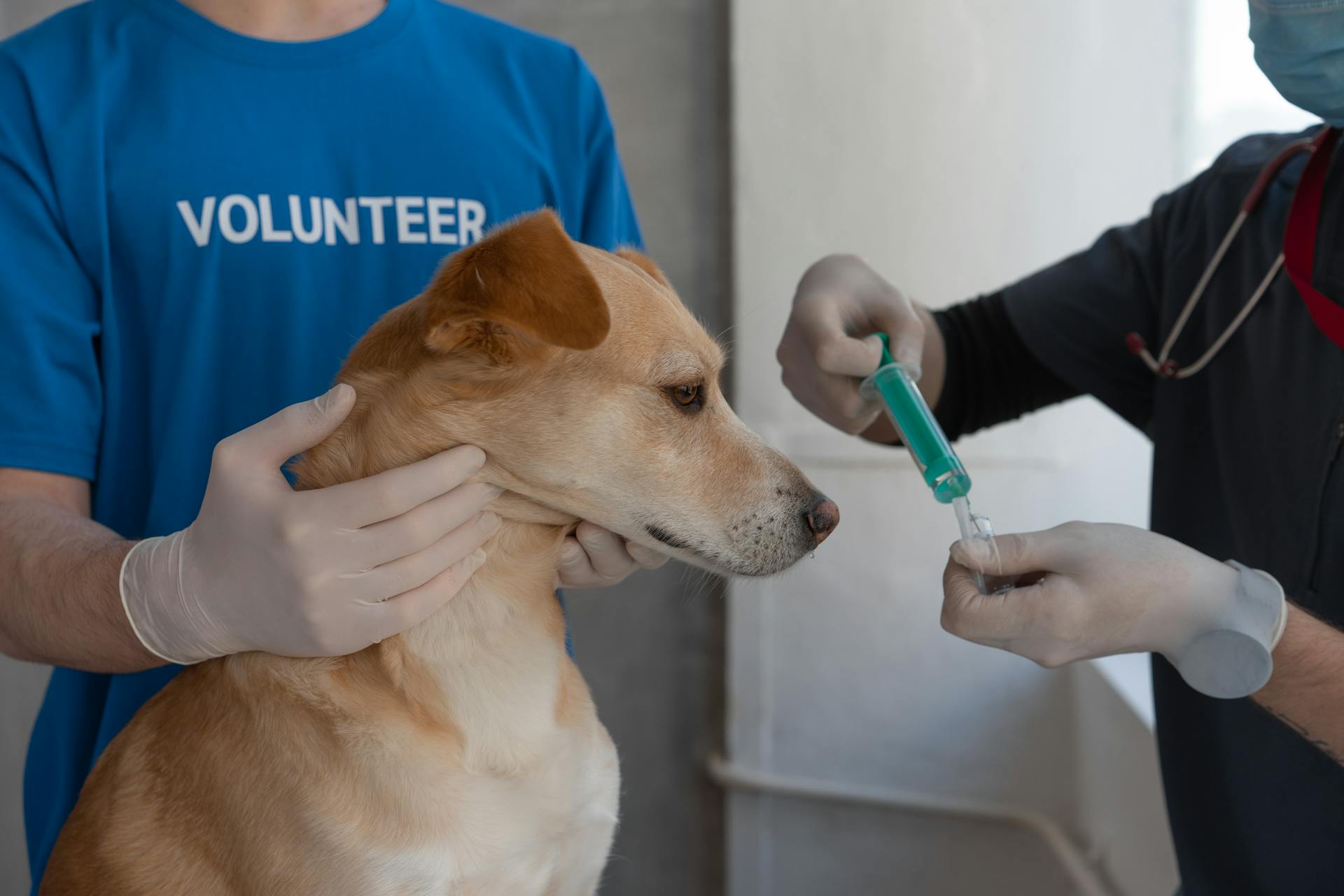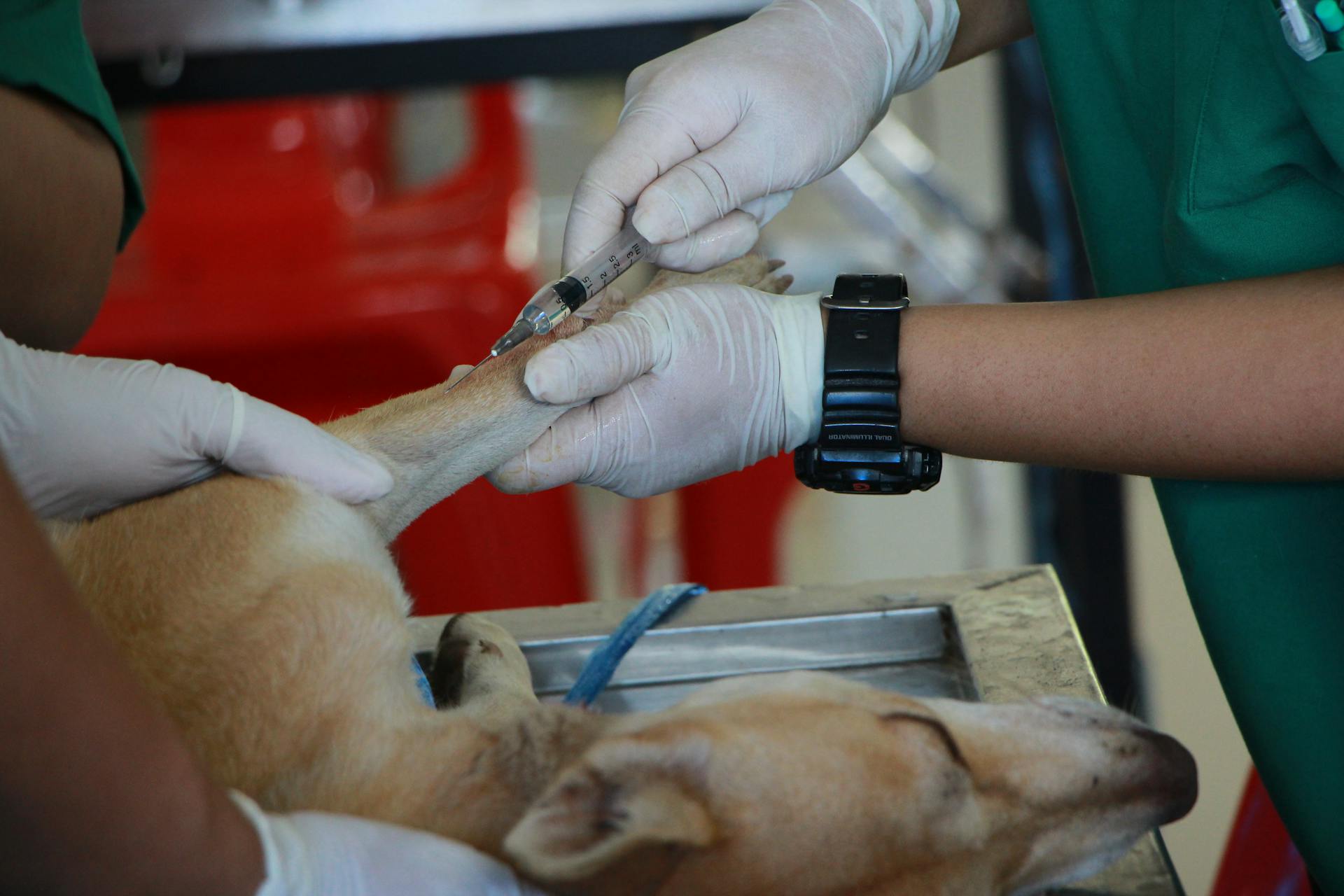
Dogs can still get kennel cough after vaccination, but the risk is lower.
Kennel cough is a highly contagious respiratory disease caused by the Bordetella bronchiseptica bacteria.
The Bordetella vaccine is designed to protect against kennel cough, but it's not 100% effective.
Even if your dog has been vaccinated, they can still contract kennel cough if they're exposed to a large number of infected dogs.
You might enjoy: Is Kennel Cough and Bordetella the Same
Can Dogs Get Kennel Cough After Vaccination?
Dogs can develop kennel cough even if they were vaccinated, which may seem unfair but is not uncommon.
The vaccine is only effective for about 6 months, so annual vaccines do not provide adequate coverage. If the vaccine was not adequately stored or properly administered, it may also prove ineffective.
Dogs with compromised immune systems or dogs that were exposed to kennel cough before receiving the vaccine may develop the illness in spite of vaccination.
Kennel cough is not usually a serious illness and your dog should make a full, and uneventful recovery.
The combination of factors involved make the condition hard to vaccinate for, as multiple viruses can contribute to the development of illness and the bacteria is widely distributed and accessible.
Here are the possible reasons why your dog may still get kennel cough after vaccination:
- Compromised immune system
- Exposure to kennel cough before receiving the vaccine
- Insufficient or ineffective vaccination
Vaccine Side Effects and Allergic Reactions
Mild side effects from the Bordetella vaccine are not only possible but should be expected. These reactions are generally mild and short-lived, so while it's worrying to see your dog having these side effects, it's essential to remember that they are healthier and safer for it.
Some common side effects of the Bordetella vaccination include lethargy, lumps & bumps, sneezing & cold-like symptoms, and in rare cases, a persistent cough.
If your dog is experiencing any of the symptoms of an anaphylactic response, such as swelling in the face, hives, vomiting, breathing difficulties, diarrhea, and itchiness, contact your emergency veterinarian as soon as possible.
Here are the most common side effects of the Bordetella vaccination:
- Lethargy
- Lumps & Bumps
- Sneezing & Cold-Like Symptoms
In rare cases, serious adverse reactions to the vaccine may require medical intervention.
Vaccine Side Effects and Allergic Reactions
Vaccine side effects are a normal part of the vaccination process, and they're usually mild and short-lived.
Most common side effects of the Bordetella vaccine include lethargy, lumps and bumps, and sneezing and cold-like symptoms. These symptoms are generally mild and should only last a day or two.
If your dog is showing any of these symptoms, it's essential to monitor their behavior and consult with your veterinarian if they persist.
In extremely rare cases, dogs can have an anaphylactic response to the Bordetella vaccine, characterized by swelling in the face, hives, vomiting, breathing difficulties, diarrhea, and itchiness. This reaction can occur within a few minutes or hours after vaccination, but it can also occur as late as 48 hours later.
If you suspect your dog is experiencing an anaphylactic reaction, contact your emergency veterinarian as soon as possible.
Here are the most common side effects of the Bordetella vaccine:
- Lethargy
- Lumps & Bumps
- Sneezing & Cold-Like Symptoms
Benefits of Vaccination
The benefits of vaccination are numerous, and in the case of the Bordetella vaccine, it greatly reduces the chance of Bordetella in dogs.
While not 100% effective in preventing infection, the vaccine is guaranteed to decrease the likelihood of serious symptoms or life-threatening complications should a dog vaccinated against Bordetella contract an infection.
Simple respiratory infections can develop into serious life-threatening conditions, so protecting your dog with the Bordetella shot is crucial.
Giving your dog the vaccine can help to greatly reduce the risk and severity of this respiratory illness, making it a vital part of their preventative care plan.
Many doggy daycares, dog parks, or obedience classes will require your dog to be vaccinated against kennel cough to take part, so be sure to ask your vet about the Bordetella shot for your dog.
The Bordetella vaccine is an optional 'lifestyle' vaccination, but it's one that can make a big difference in your dog's health and safety.
For another approach, see: Vaccinated Dog
What to Do If Your Dog Coughs
If your dog is coughing after receiving the Bordetella vaccine, reactions to the vaccine are generally short-lived and mild. In most cases, a persistent cough will resolve on its own within a day or two.
However, if your dog demonstrates a persistent cough or other symptoms for more than a day or two, it's essential to contact your vet to seek additional medical care. Rare extreme cases may require medical intervention.
For an accurate diagnosis of your pet's condition, it's best to schedule an appointment with your vet, as the advice provided here is only for informational purposes.
Consider reading: Vet Prescription
Coughing: What to Do
Reactions to the Bordetella vaccine are short-lived and mild.
If your dog is coughing after receiving the vaccine, it's essential to monitor the situation closely.
Reactions to the vaccine are mild and short-lived, but if your dog demonstrates a persistent cough for more than a day or two, you should contact your vet to seek additional medical care.
In rare extreme cases, a serious adverse reaction to the vaccine may require medical intervention.
Don't hesitate to reach out to your vet if you're concerned about your dog's health.
What to Do If My Cat Coughs?
If your cat starts coughing, it's essential to monitor its symptoms and seek veterinary care if they persist. In most cases, reactions to a vaccine are mild and short in duration.
Reactions to a vaccine can be a common cause of coughing in cats. If your cat exhibits a persistent cough for more than a day or two, you should contact your vet to seek additional medical care.
In rare extreme cases, a serious adverse reaction to the vaccine may require medical intervention.
A unique perspective: Pomeranian Dog Coughing
Vaccination and Shot Frequency
The Bordetella vaccine is a crucial part of preventing kennel cough in dogs. It greatly reduces the chance of Bordetella in dogs.
Your veterinarian will recommend a Bordetella booster shot every six-to-twelve months based on your pet's risk of exposure to Bordetella. This ensures your dog stays protected against the illness.
The Bordetella vaccine comes in two different forms: an intranasal spray and an injection. Both are comparably effective at preventing this illness.
Shot Frequency

Your veterinarian will recommend a Bordetella booster shot every six-to-twelve months based on your pet's risk of exposure to Bordetella.
The Bordetella vaccination comes in two different forms: an intranasal spray and an injection. Both are comparably effective at preventing this illness.
The injectable Bordetella vaccination isn't suitable for dogs younger than 8 weeks old.
You can administer the nasal spray version to dogs as young as 6 weeks old.
How Often Does a Cat Need a Shot?
Your veterinarian will recommend a Bordetella booster shot every six-to-twelve months based on your pet's risk of exposure to Bordetella.
The frequency of shots is not explicitly mentioned for cats, but we can look at the example of dogs to understand the importance of booster shots.
Your veterinarian will determine the best vaccination schedule for your cat based on their individual needs and risk factors.
Just like dogs, cats need regular check-ups with their veterinarian to stay up-to-date on their vaccinations and prevent disease.
For more insights, see: Kennel Cough in Kittens
The injectable Bordetella vaccine isn't suitable for dogs younger than 8 weeks, but the nasal spray version can be administered to dogs as young as 6 weeks old.
This information is not directly relevant to cats, but it highlights the importance of considering the age and health of your pet when determining vaccination schedules.
By following your veterinarian's recommendations and staying informed about vaccination schedules, you can help keep your cat healthy and happy.
Vaccinating Against
The Bordetella vaccine is sometimes considered optional, rather than a core vaccination, but many doggy daycares, dog parks, or obedience classes will require your dog to be vaccinated against kennel cough to take part.
The vaccine greatly reduces the chance of Bordetella in dogs. It's not 100% effective in preventing infection, but it's guaranteed to decrease the likelihood of serious symptoms or life-threatening complications should a dog vaccinated against Bordetella contract an infection.
Kennel cough is a respiratory infection that develops as a result of exposure to the kennel cough bacteria, which dogs are commonly exposed to, and is present in many environments. It's not dissimilar to a chest cold in humans.
The vaccine is only effective for about 6 months, so annual vaccines do not provide adequate coverage. If the vaccine was not adequately stored or properly administered, it may also prove ineffective.
If your dog will be interacting with other dogs regularly, such as at dog parks or daycare, you should ask your vet about the Bordetella shot for your dog.
Frequently Asked Questions
What are the first symptoms of kennel cough?
The first symptoms of kennel cough in dogs include a persistent dry cough, often sounding like a goose honk or a stuck object, and may be accompanied by a runny nose, sneezing, and lack of energy. If you notice these symptoms, it's essential to seek veterinary attention to confirm the diagnosis and start treatment.
How did my dog get kennel cough without being around other dogs?
Your dog may have contracted kennel cough through aerosols from another dog's cough or sneeze, or by coming into contact with contaminated surfaces that other dogs have touched. This means kennel cough can spread even if your dog hasn't been directly exposed to other dogs.
How long after Bordetella shot to take effect?
The Bordetella vaccine typically takes effect within 48-72 hours after administration, providing fast protection against Bordetella infections. However, it's recommended to vaccinate 1-2 weeks before potential exposure for optimal protection.
How long are dogs contagious with kennel cough?
Dogs with kennel cough are typically contagious for 10-14 days, but antibiotics can shorten this window. Learn more about kennel cough symptoms and treatment options.
Sources
- https://pinnaclepets.com/kennel-cough-misconceptions/
- https://wagwalking.com/wellness/can-dogs-get-kennel-cough-if-vaccinated
- https://www.cedaranimalmedicalcenter.com/site/blog/2024/02/15/dog-reaction-bordetella-vaccine
- https://www.houstoncountyanimalclinic.com/site/blog/2022/12/15/dog-reaction-bordetella-vaccine
- https://www.quailhollowvet.com/site/blog/2022/09/15/dog-reaction-bordetella-vaccine
Featured Images: pexels.com


